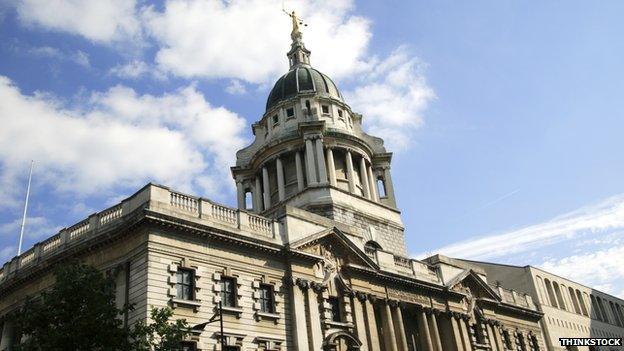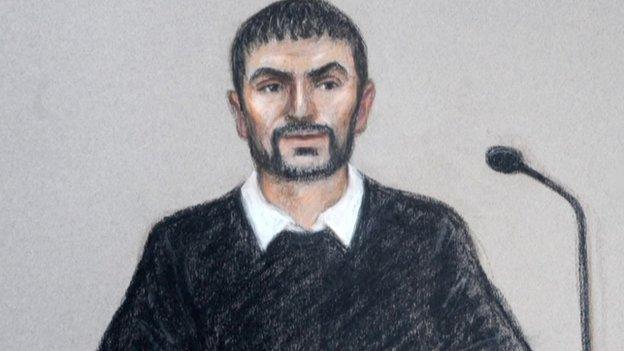Secret trial: Six unanswered questions
- Published

Behind closed doors: the Incedal trial was in Court Nine of the Old Bailey
An important principle in the British legal system is that "not only must justice be done, it must also be seen to be done".
Civil liberties campaigners and some in the legal profession fear the unprecedented levels of secrecy in the trials of Erol Incedal mean the second part of that principle has not been satisfied.
Throughout this unique case, it has been difficult to assess the strength of the prosecution and the defence because key features of what you would normally expect to see in an open criminal trial were absent as a result of the secrecy.
The jury will have heard all of the case. A group of selected journalists have also been allowed into several sessions in which they could monitor proceedings - but they are not allowed to report on them.
What they know remains secret. The judge warned jurors today not to divulge any of those secrets.
For the rest of us, there are a number of big questions raised by both the trial and the retrial that are still to be answered.

Why was this trial so secret?
Before Incedal's first trial began, prosecutors told the Court of Appeal the prosecution may have to be abandoned if any of it were held in public.
This was said to be in the interests of national security. We never knew more than that.
Their application for a blanket ban - supported by the trial judge - was ultimately unsuccessful when the Court of Appeal said the public had to be able to understand at least some of the process.
It is difficult to know whether that has actually been achieved since, as a journalist excluded from so many sessions, viewing these two trials has been a slightly perplexing experience.

How strong was the evidence?
We heard about some key pieces of evidence in the case, such as a memory card containing bomb-making instructions and a piece of paper with an address for the Blairs.
But we saw very little evidence being challenged by defence lawyers. Most of these sessions were behind closed doors.
As a consequence it is difficult to assess how significant or probative each piece of evidence was.

Who was Incedal alleged to have conspired with?
The prosecution told the court he had been "actively engaged with another or others who were abroad".
During the retrial, we found out this was said to be a British extremist known as "Ahmed", whom Incedal had met on the border between Turkey and Syria.
We don't know any more about him.
We heard Incedal mention in a bugged conversation having been in Syria in the winter but again we know no more than that.

Who were the alleged targets for attack?
Incedal was charged with preparing for attacks - and he's now been cleared of that charge.
This law was designed to help police intervene when conspiracies are at an early stage.
It is not unusual for a court to be told there had been no "settled plan" - and therefore there may be a range of possible targets.
This prosecution case was no different in that sense.
The prosecution spoke of an alleged plan of attack "against a limited number of individuals" - but we don't know what that means.
They mentioned "an individual of significance".
This was possibly a reference to Tony Blair but we don't know that there weren't others.
Finally, the jury heard allegations that Incedal might have been considering a more wide-ranging and indiscriminate gun attack, such as the one in Mumbai in 2008. He was acquitted on this count.

What sort of attack did prosecutors allege he was considering?
We heard that Incedal had been convicted at his first trial of having bomb-making instructions. Reference was made too to "communications about detonators" and he had allegedly sought to buy a gun, but there was no evidence in the open sessions to show he had acquired any weapons.
This would not be necessary to secure a conviction - but in cases of this nature the court typically hears prosecution and defence evidence relating to the source of weaponry.

What was Incedal's defence?
We have been told by the defendant he had a "reasonable excuse" for having the bomb-making instructions for which he was convicted in the first trial.
But what was it?
We do not know much of what Incedal's defence was to the main charge of engaging in conduct in preparation of terrorist acts, although the judge referred in his summing up to how Incedal claimed to have been considering conducting an armed robbery with the sons of the imprisoned extremist cleric Abu Hamza al-Masri.
Was any of this the heart of the case - or was the real defence something said in the closed court?
- Published26 March 2015
